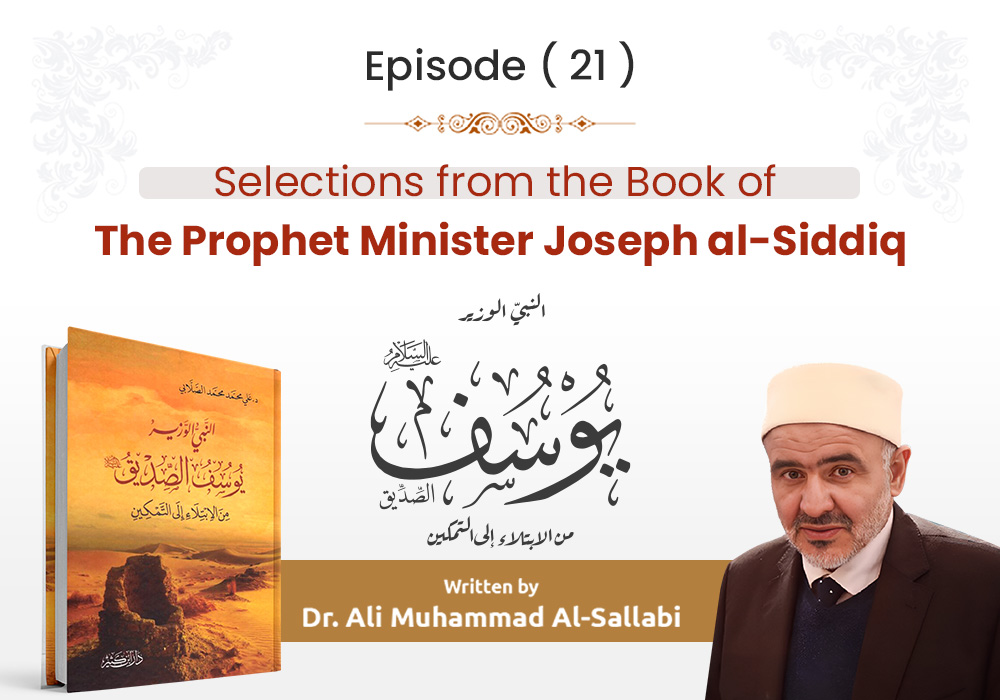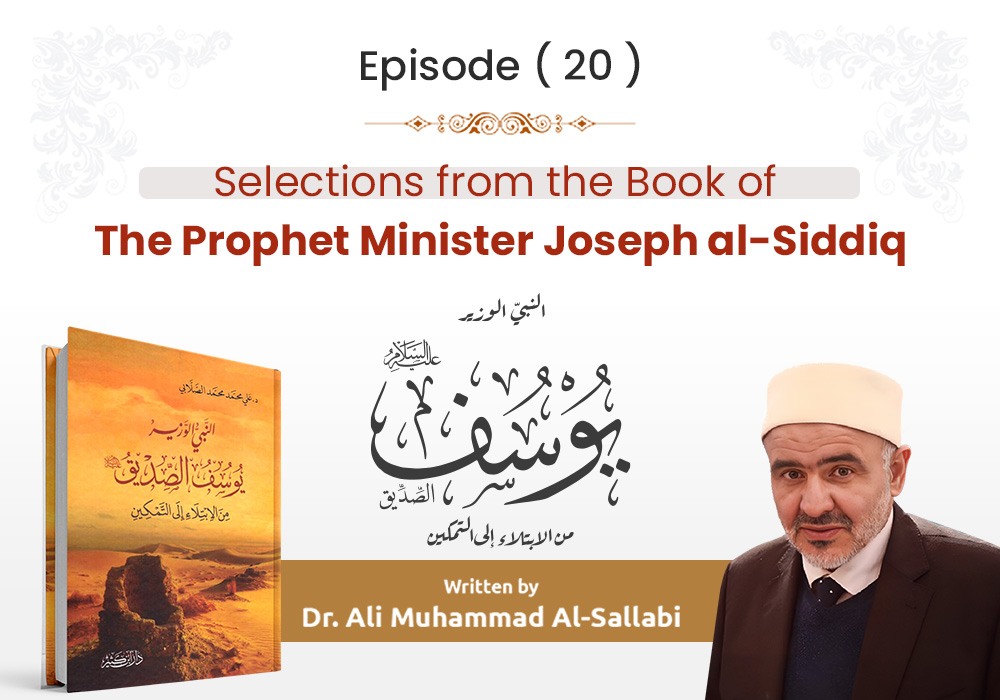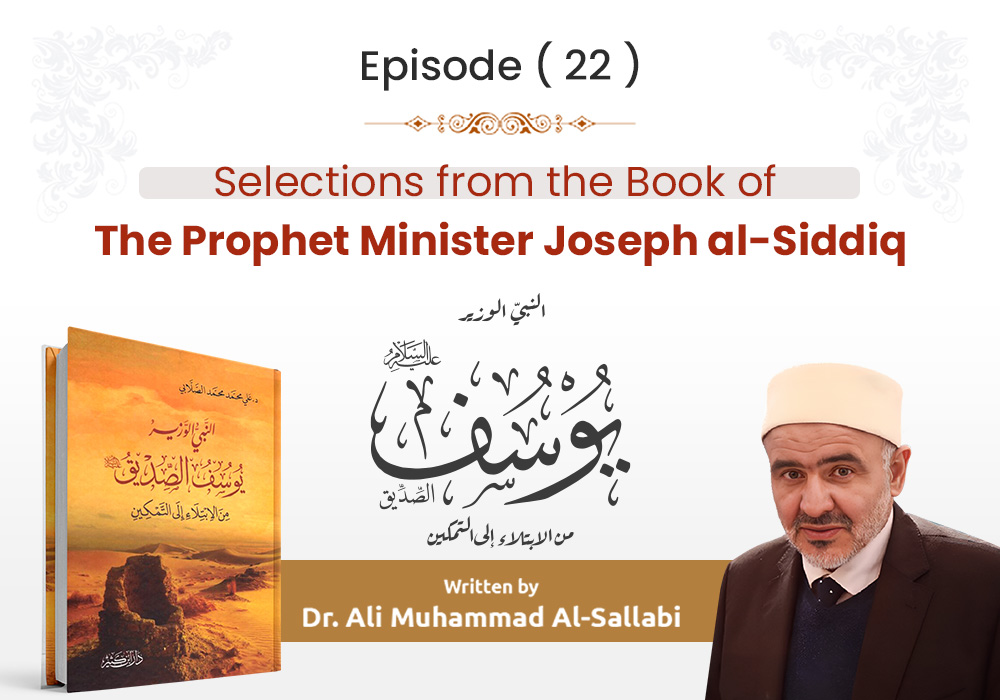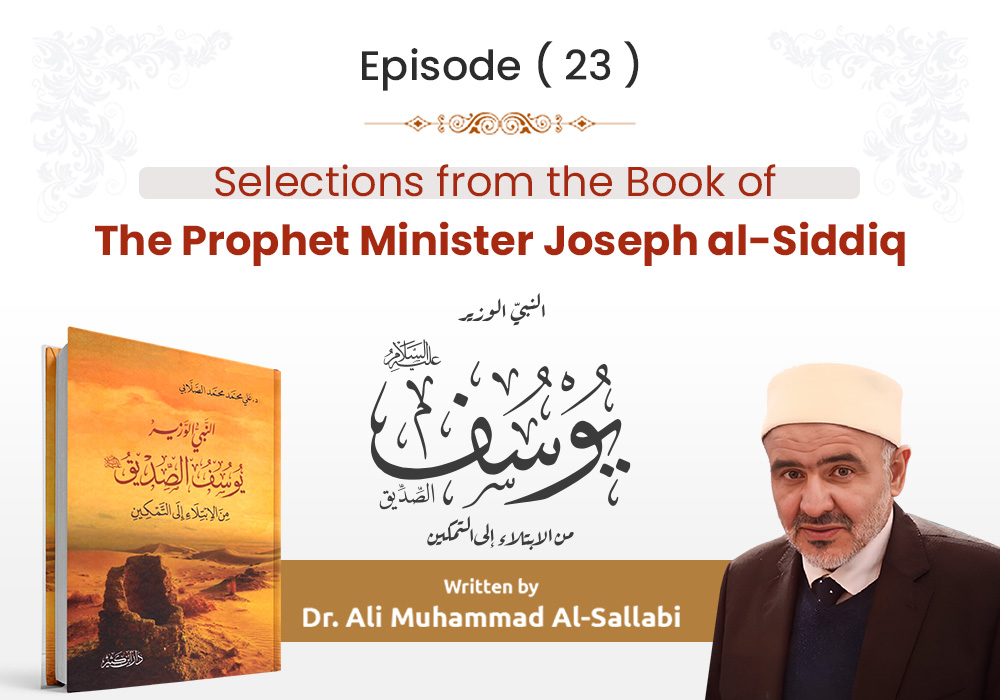The Two Planning Pillars: Prediction and Objectives
Selections from the Book The Prophet Minister Joseph al-Siddiq…
Written by Dr. Ali Muhammad al-Sallabi...
Episode (21)
As for prediction, it involves foreseeing the future and anticipating what is to come. This is precisely what Joseph did based on the knowledge bestowed upon him by Allah. Additionally, he also defined objectives such as increasing production, regulating or minimizing consumption, and storing food. These objectives require detailed plans because overarching goals are meaningless without detailed plans to achieve them. This is where policies, means, tools, human resources, procedures, timelines, and budgeting come into play. This is what Joseph did in light of modern management principles. Although the Holy Quran succinctly portrays Joseph's actions, it does not explicitly mention human development. However, it is undoubtedly included within the plan because the Holy Quran teaches us that a person is defined by their psyche, content, and essence, and that changing external factors without changing internal ones achieves nothing.
Indeed, Joseph (peace be upon him) incorporated the human element into his plan because he knew that a plan without human involvement cannot succeed. His approach to dealing with people is evident in his invitation to the prisoners to unify their worship of Allah and dedicate their worship to Him alone. This reflects his methodology in elevating humanity, which is the essence of civilization, the driving force of progress, the executor of programs, and the achiever of projects. His call to monotheism and teaching the true faith in Allah, the universe, and life itself aimed at nurturing individuals who are trustworthy in implementing external changes. The benefits of external change fade away if there is no trustworthy individual behind the achievements of external change, who possesses integrity, honesty, and trustworthiness. Change must be practiced by individuals on a psychological level first, as they develop and improve themselves towards betterment. Then, they manifest their psychological content into external change, translating it into practice, application, and achievement. Because the conditions and social situations of people, whether corrupt or virtuous, do not change unless the content of individuals and their adherence to truth or falsehood change. This is the logic of the Holy Quran, and for life to establish a system, it must first prepare a human being.
If we develop the system and its concepts without addressing the human being and their values, corruption will quickly seep from individuals into the system, corrupting it even more than the reforms that may come from the system to the individual to rectify it. This is because selfishness, self-love, and greed are stronger than the texts of laws and systems unless they are refined by deep internal education and noble ethics built on knowledge of Allah, love for Him, and fear of Him.
The noble Qur’anic verses point to other aspects to which the success of the plan is directly linked, the most important of which are two aspects united by one element, which is the human element and its relationship to the success of the plan:
1- The readiness of Joseph, peace be upon him, to oversee the implementation of this plan came after he dispelled the shadows of doubt and illusions of accusations about himself. Thus, a strong integration occurred between the plan and the planners, between numerical calculations and ethical considerations, between material foundations and spiritual values in society, between religion and life.
2- The second aspect is manifested in Joseph's choice of assistants who helped him in his work. Among the men of Joseph, peace be upon him, were those appointed with sincerity to execute his orders with precision and calmness.
The Quranic verses also indicated the certain knowledge upon which Joseph built his plan, Almighty Allah says: {Then will come after that seven difficult [years] which will consume what you advanced [i.e., saved] for them, except a little from which you will store} [Yusuf: 48].
One of the hallmarks of a successful political and economic plan is that it is built on true and reliable technical information, not on fanciful imagination disconnected from reality. Hence, Joseph (peace be upon him) honestly informed the people about the hardships that awaited them. However, this honesty was not meant to discourage or demoralize them, but rather to spur them to action, increase their determination, and double their efforts and energy. The seven difficult years that follow prosperity will be challenging and demanding, requiring vigilance and precaution.
- {Then will come after that seven difficult [years]} [Yusuf: 48]. There will be no cultivation during those years; they will consume what you have stored for them. It is as if these years themselves devour everything you provide due to their extreme hunger and neediness: {except a little from which you will store} [Yusuf: 48]. Meaning, except for a little of what you safeguard and protect from their voracious consumption. Then these years of severe famine will pass, the barren years that come upon what you have stored and saved during the years of abundance. Afterward, a year of prosperity follows, wherein people are relieved with crops and water, and their vineyards flourish, yielding wine, oil, and vegetables. Here, we notice that this year of prosperity does not have a symbol in the king's dream, as it is knowledge of the unseen given to Prophet Joseph (peace be upon him) by Almighty Allah.
Thus, Joseph informed the cupbearer to convey the good tidings to the king and the people of salvation from drought and famine in a year of abundant prosperity. And we notice in the noble Quranic verses that spoke about the plan of Joseph, peace be upon him, the element of hope and optimism, and this is important in a successful plan. Almighty Allah says: {Then will come after that a year in which the people will be given rain and in which they will press [olives and grapes]} [Yusuf: 49] After the hardship mentioned by Joseph, there will be relief and prosperity, and matters will, by the permission of Allah, return to their original course.
However, the beginning of this return will be a blessed year, unprecedented in its generosity and abundance. It's as if the rain and gain in it will overflow effortlessly: {a year in which the people will be given rain and in which they will press [olives and grapes]}; Meaning: they will be provided with rain, or they will be aided: rescued from hardship, and all of this is interconnected; {in which the people will be given rain and in which they will press [olives and grapes]} is another indication of the abundance of abundance. People won't resort to pressing fruits until after their basic consumption needs, such as food, are met. There must be hope and optimism in any plan; otherwise, what's the point of working? Indeed, Joseph, peace be upon him, motivated them to work by warning them about the severity of the years of famine, then he motivated them again by opening the window of hope.
Indeed, Joseph was oppressed and persecuted in the king's prison, despite possessing knowledge and plans that would have made him powerful in negotiations. However, he did not demand anything for himself; rather, he generously offered goodness, generosity, advice, and guidance without expecting anything in return from people. These noble morals and beautiful qualities are honored by Allah in those whom He intends to make examples for His religion and teachers of His call. We notice that Joseph, peace be upon him, understood the diversity in opinions, as the king and the people were far from his method, immersed in the ways of ignorance. Despite this, he met them in pure goodness and worked towards saving the country and its people during the hardship of famine. This breadth of understanding and deep comprehension is needed by those who engage in calling people and urging them towards establishing the religion of Allah on earth.
From the fruits of Joseph's planning and strategizing was saving the people from destruction and hunger, leading them out of hardship and back to prosperity. In this Quranic story, there are indications of strategic planning, so that we understand that Islam is not based on guesswork or complacency, but it cares about the most precise and profound methods, whether in economic, political, or other aspects.
- Ali Muhammad al-Sallabi, The Prophet Minister Joseph al-Siddiq, pp. 412-416.
- Surat Yusuf, analytical study, p. 428.
- Jurisprudence of Victory and Empowerment, by Al-Sallabi, p. 282.
- In the Shadows of the Qur’an, (4/1994).
- Islamic Positions, pp. 86-89.
For further information and review of the sources for the article, see:
The Book of The Prophet Minister Joseph al-Siddiq on the official website of Sheikh Dr. Ali Muhammad al-Sallabi:






